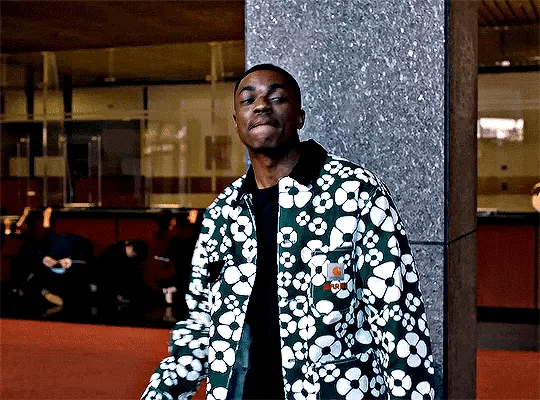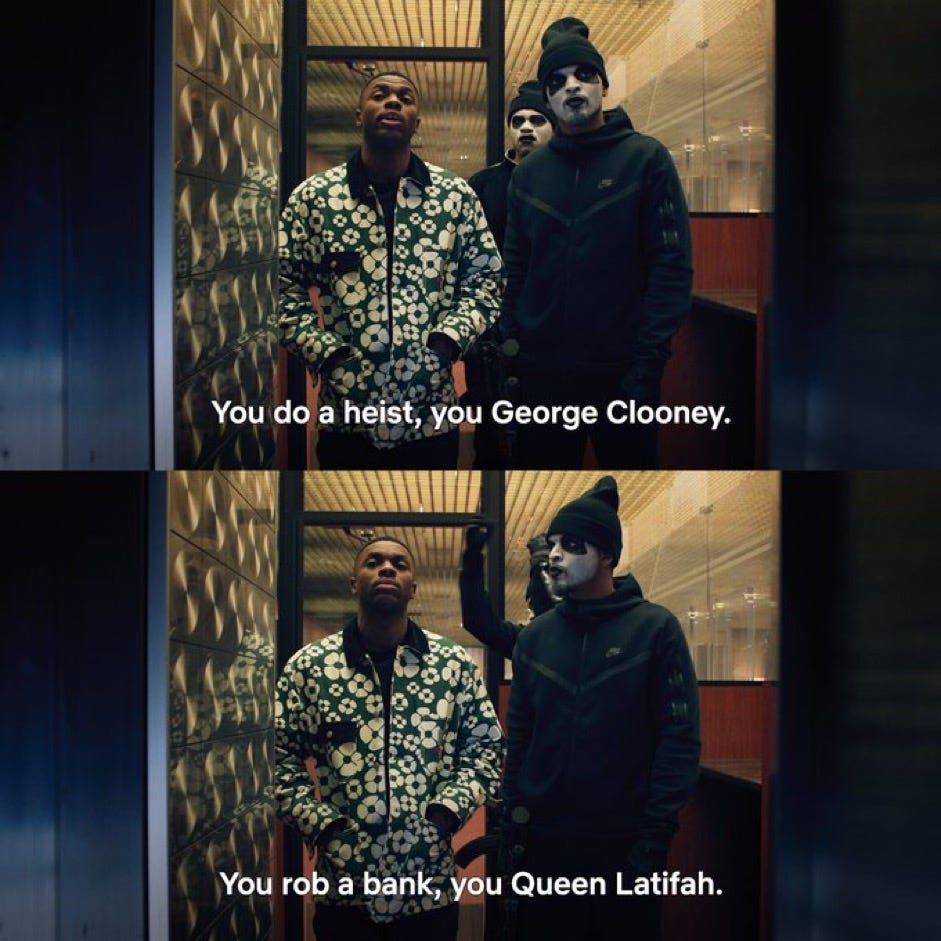Black Business: Blackness, Rejection, and How Wealth & Whiteness Works Against You Because It Worked For You
On The Vince Staples Show Episode 2: Black Business
Last week there was an article in The Cut by a financial columnist who explained how she got scammed into handing over $50,000 in a shoe box.
Reactions were extreme from glee to horror. Some chucked it up to stupidity others have claimed the article itself is one big lie. One stance that struck me was that she only fell into this trap because of the intersection of her race and socioeconomic status.
Her specific identity markers made her not only wealthy enough to be a target to begin with but it also made her trusting of law enforcement in ways that less wealthy and or Black people may not be. She was trusting enough or perhaps naive enough to believe that all of those offices from the CIA to the FBI would all work together to protect her identity and her wealth. Episode 2 of the newly released The Vince Staples Show titled “Black Business” also mirrored the sentiment that sometimes Blackness and the experiences shaped by blackness can prepare you to navigate and survive situations that people who are not Black wouldn’t.
*SPOILERS AHEAD*
In the episode, Vince is immediately faced with microaggressions at the bank first because he is black and dressed formally, and secondly because he is an artist. On his entrance, the lady immediately tells him without even looking into his eyes that bathrooms are for customers only. She not only doesn’t think that he could be a client, but she doesn’t even give him the dignity of looking at him as a person. He suffers because of his race and assumed socioeconomic status.
“It’s out of my hands” - A quote on racism
Vince goes on to finally see a loan officer where he pitches his sugar-free healthy cereal. The entire interaction is shady as fuck. The loan officer is condescending and flippant about Vince’s idea even after learning that Vince has advances on 15 albums at $500,000 each. He insists that half a million dollars isn’t a lot of money and goes on to drone about the level of wealth his current clients have (private islands, yachts, etc). He says that he must refuse the loan and it’s out of his hands.
Shortly after leaving, Vince meets Rick Ross, another wealthy entertainer who explains that he needs to diversify and buy land. Rick even offers to give him some money but Vince politely refuses. (Rick’s presence was fleeting and left me with a lot more questions than answers. Was he in the bank the entire episode?)
“We here to steal the bank money, not your money” -bank robber #1
Robbers enter the bank and the situation flips. Vince’s fame via art(rapping) and his blackness save him. The robbers specifically say “the only n*gga in here” when asking him to turn around. It is when he turns around and is finally recognized as a friend that the significance of his blackness comes into play. “I know that’s not the homie,” bank robber #1 says. They go on to talk about each other’s families and solutions to mom’s arthritis and many more trivial but intimate topics. The juxtaposition of the tender conversation between Vince and the robber with the panic and rounding up of the other White patrons is odd because we typically only see robbers in a violent light.
There are many points in the scene where the robbers show some sense of humanity. Once they stop a pregnant lady and assure her they won’t do anything to harm her because of the baby. They even ask how far along she is and what her plans are for a gender reveal. Bank robber #1 insists she go sit down and elevate her feet. “She carrying it well too,” he says as she walks away to sit and put her feet up.
While all other (White) patrons and staff at the bank are confined with zip ties Vince remains free. Even later in the episode when he goes down to the basement and finds another Black man there the Black man (intent on sweeping) also remains physically free. The argument can be made that he is mentally shackled due to his statements about the new owner of the bank.
“When he eats I eats! So if he says sweep I’ll sweep”.
His loyalty is so fierce he doesn’t even recognize Vince as a threat. He states his piece and continues to go about working. In some ways, it demonstrates the sheer lack of fear for his peer over the twisted love for the new bank owner. (We never hear or see Rick Ross again so I’m assuming he has left the bank but if he hasn’t then we can also lump him up with these two as examples of another Black non-bank-robber who remains free.) In contrast, the White loan officer who earlier was rude and flippant towards Vince begins to beg Vince to save his life.
“I came to get a loan. They wasn’t really fucking with me. You know typical shit redlining, gaslighting, gatekeeping. Typical shit,” Vince says to one of his friends who calls him from jail.
“Man fuck them we don’t tolerate no prejudices or racism” his friend in jail offers to come and pay them back for refusing Vince a loan. This is another case where Vince’s racial and socioeconomic positioning would’ve led someone to work with him and for him. He turns down his friend’s offer similar to how he refuses Rick Ross’s.
Loan Officer’s Lifeline
Eventually, Vince manages to get the code to the safe. He brings it upstairs and finally opens the safe only to realize that someone else beat them to it! This scene cemented my position of the focus of the episode being about the perception and difference in situational outcomes based on race and socioeconomic status. Once Vince realizes the safe is empty he tells the robbers.
“How are we the second robbers here today?” asks bank robber #1.
“In all fairness, you’re the first robber here today. This was a heist,” Vince replies.
“What’s the difference?” asks bank robber #1.
“It’s simple. You do a heist, you George Clooney. You rob a bank, you Queen Latifah.” I assume this references the difference between the two movies Oceans 11 and Set It Off. While Clooney’s character escapes with the money and his life Queen Latifah’s character is shot and killed. Two different outcomes for the same action.
“Everything ain’t great bro.”
Towards the end of the show, surrounded by police the first robber opens up to Vince. He expresses that earlier his insistence that he was on top of the world and everything was going great was all ego. “I just wanna feel like I’m enough,” he says. It’s jarring because in this situation he has all the (violent) power and was even in a position to put Vince in a position of power such that the loan officer who snubbed him earlier begged and pleaded for him to save his life. The layers of power become overshadowed by his reality outside the bank. His feelings about powerlessness is expressed as the screen pans to show you white bank patrons laying down with their hand zip ties is a subtle nod to the temporary nature of his current power.
“I’m trying to be up here like you with all these White folks.”
“They wouldn’t even give me a loan bro.”
Those two statements highlight Vince’s separation from the bank patrons despite bank robber #1’s recognition of his fame and fortune. In some ways, this also highlights that Vince indeed is even closer socioeconomically to bank robber #1 than he expected.
Eventually, Vince convinces bank robber #1 to let him and the loan officer out. As they walk out the police insist that they raise their hands. Vince complies presumably because he knows and has seen from his experience as a Black man what happens when you do not listen to the police. The bank manager however ignores the warning. Instead, he reaches into his pocket for a pocket square to wipe his face. Vince tries to warn him but the loan officer ignores him. The loan officer is then shot in the face. One can only presume that the bank teller, because of his own experiences as a white man (similar to the lady in The Cut’s article), just expected a different outcome with the police because of his wealth and status.
It is so fascinating to me how neatly and humorously Vince made his point and how well-timed the article in The Cut was at highlighting the different ways that wealth, status, race, and socioeconomic factors work against you because they have always worked for you.
Have you watched Vince’s show what was your favorite episode? Did it live up to your expectations? Did you read the article in The Cut? What was your immediate thought? Remember, engage with respect or not at all.
For all of you who have already subscribed thanks so much!! Tune in next Tuesday for my next newsletter.
For those of you who haven’t subscribed yet, it’s never too late to join my smart and funny subscribers (nickname pending)!
For those who love this piece, can’t subscribe but want to drop a little coin my way you can do so here.
Read some of my other pieces here:
1. Humbleness Is A Luxury I Can't Afford
2. Food
3. Life is for consuming








I just want to point out that I got to this essay by reading your essay about Black womens and anger, and now I’m looking for the Vince Staples show 😭😭
I don’t watch this show but it sounds interesting and I’m heading to read The Cut article now 🤸🏾♀️